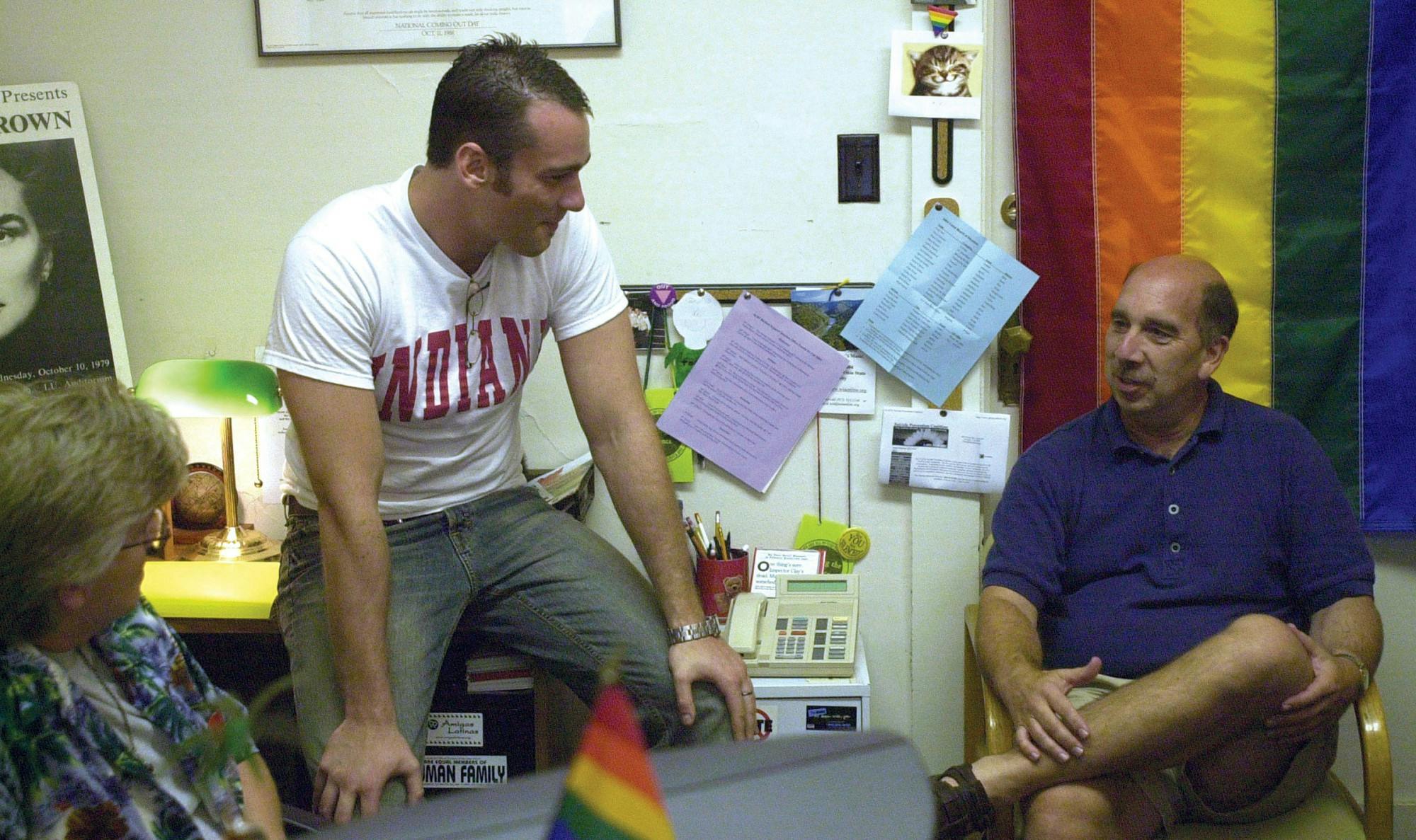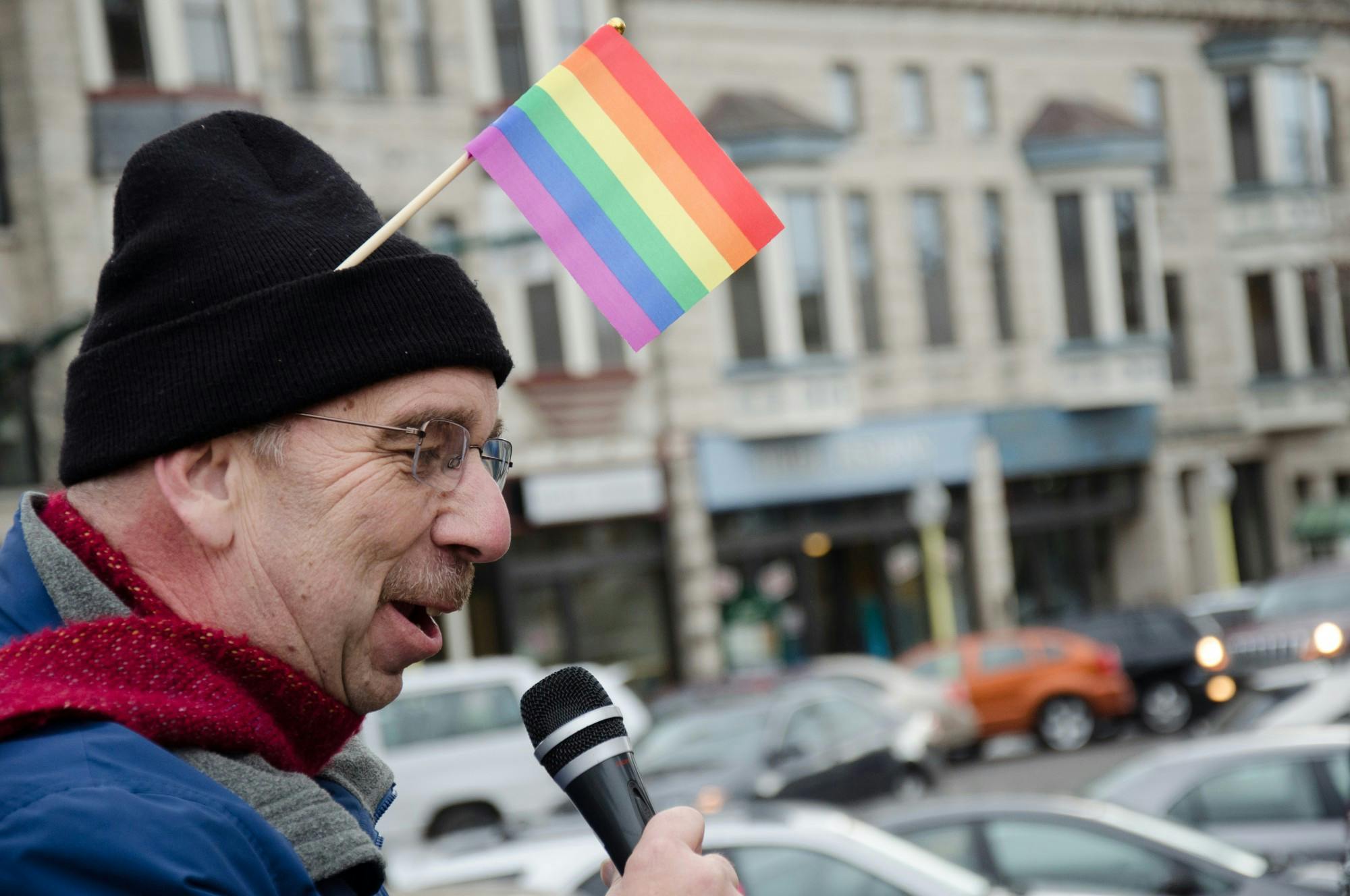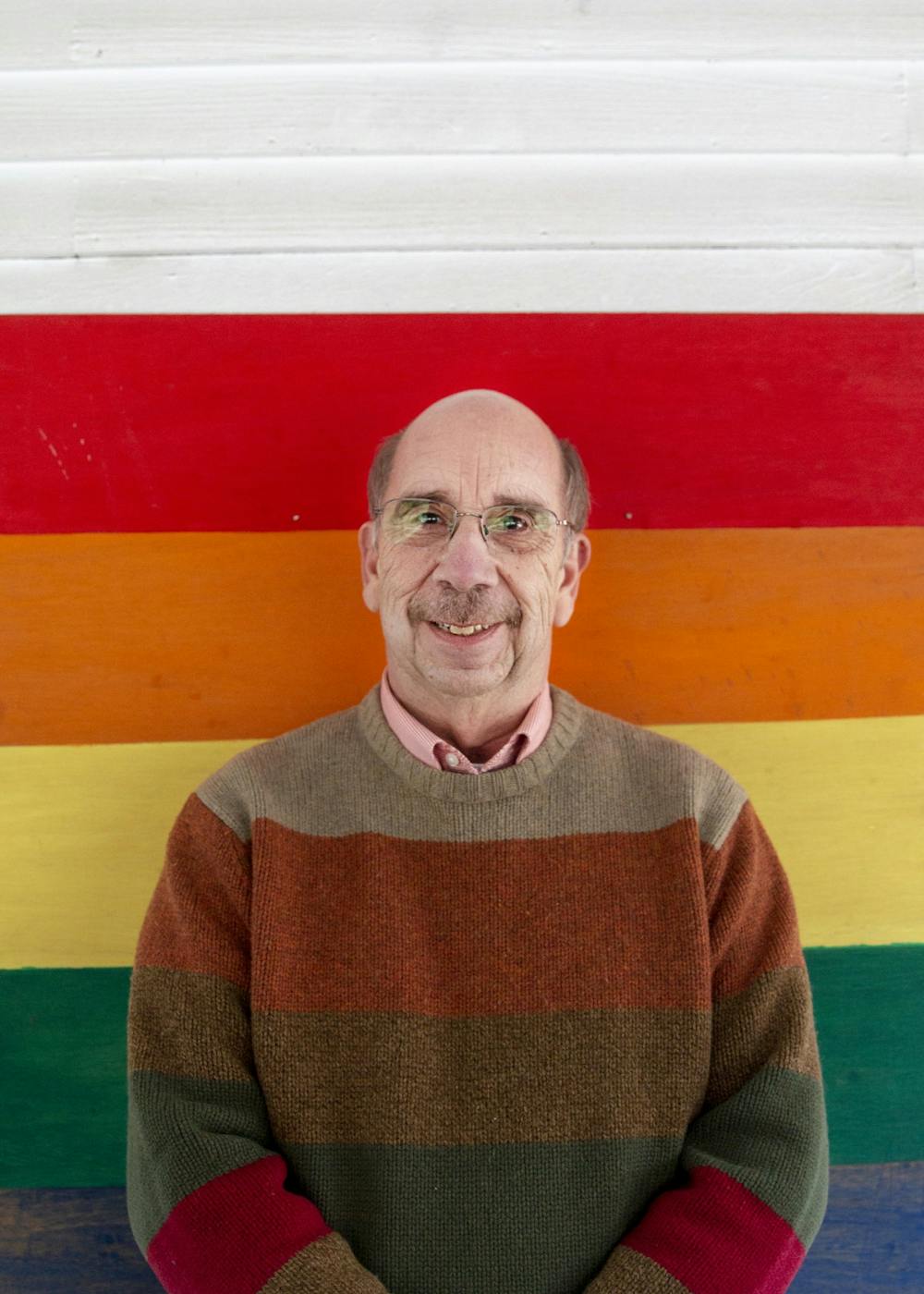Doug Bauder found out gay marriage had officially been legalized by the U.S. Supreme Court one day five years ago while he was at work.
He and his partner, Marty Siegel, had discussed the issue and didn’t feel like it was a big deal to them. They had already lived together for 20 years. They collectively had four children and 10 grandchildren. They had legal protection. They had built a life together, and they were happy with the way things were.
But when Bauder got home from work that day, he got down on one knee before Siegel and asked him to marry him.
Siegel didn’t say yes right away. Bauder and Siegel both have children from previous marriages. When he and Bauder first became partners, the kids were all pretty young. They knew what was going on, but it took a while for them to come to terms with having gay dads.
Twenty years later, Siegel wanted to finally ask his and Bauder’s children for their blessing.
The wedding took place in their home. It was co-officiated by a minister from Bauder’s church and a rabbi from Siegel’s synagogue. It was a small ceremony, but Siegel said it was more touching than he had imagined.
“It felt so good to make those vows and to be official, and to be sanctioned by the Supreme Court,” Siegel said. “It’s a big deal.”
Bauder is the director of IU’s LGBTQ+ Culture Center and has been since the center started 25 years ago.
Bauder’s own journey to accepting his sexuality was difficult. He came out in the late ‘80s, when he was a pastor in his 30s with a wife and two children. He said the difficulties he faced coming out help him understand the struggles students on campus deal with.
Bauder is retiring this year, but he hopes to leave behind a legacy of openness, love and self-acceptance.

In the 1980s, a young man named Paul was a member of Pastor Bauder’s congregation at the church where he preached near Madison, Wisconsin. Bauder said he always suspected Paul was gay, and that he hadn’t come to terms with that part of himself.
Soon after Paul went off to college, Bauder received news that saddened him deeply. Paul had taken his own life.
“I couldn’t be of help to Paul,” Bauder said. “I think about him a lot. I think what a waste ending his life was.”
This news hit Bauder particularly hard, because he was facing a similar struggle. Bauder knew he was gay, and soon decided to come out to his friends and family.
“Sorting all of that out made me realize that my sexuality is a gift, and my being gay is not a curse — it’s a blessing,” Bauder said.
Bauder said coming out was a difficult process for him, which he described as an existential crisis. Soon after, he and his wife started going through the process of getting a divorce.
“I’m so far removed I can talk about it now somewhat, but it was terribly painful,” Bauder said.
Bauder said his wife’s attorney was homophobic and raised concerns about whether Bauder should be allowed to continue being present in his kids’ lives.
“I was feeling threatened about whether I could continue to be a dad,” Bauder said. “It was a horrible time. It was terrible.”
Bauder said his faith played a large role in helping him find his way again after coming out as gay.
“I just believe that God loves me for who I am,” Bauder said. “Loving yourself is, from my perspective, key to loving other people. That’s a basic religious tenet, and I don’t talk a lot about it, but it’s at the heart of who I am and what I do. It goes a long way to opening doors with folks of different religions, of different backgrounds.”
Bauder said his denomination, the Moravian church, emphasizes acceptance of everyone, including those who practice other religious beliefs or have different identities.
“It wasn’t until I went to grad school that I realized there were people who thought you were going to hell if you believed this way or that way or whatever, that there were bigoted people out there in terms of religion,” Bauder said.
He began to explore the gay scene in Madison, which he described as a positive community. He said finding other people of faith who identified as queer was encouraging and helped him regain his sense of identity.
His acknowledgement of his sexuality didn’t change his relationship with the church. Bauder said he continued pastoring for 10 years after he came out.
While he didn’t advertise the fact that he was gay, Bauder said his coworkers and congregation members were open and accepting to his sexuality when it did come up. Halfway through his time at the last congregation where he served, Bauder met with the board of the church to acknowledge he was gay because he was interested in doing some volunteer work for a gay-advocacy group at the time.
“They were amazingly supportive for a small rural congregation,” Bauder said. “They knew me after five years, and this didn’t really change their opinion of me.”
However, Bauder soon made the decision to stop pastoring for a different reason — he fell in love.
In 1991, Marty Siegel was going through a similar process as Bauder did 10 years prior. Married to a woman and the father of two children, Siegel had recently come out as gay in private, only to his family.
Bauder and Siegel met on a phone line, what Bauder described as a chat room before the existence of chat rooms.
“We developed a pen pal relationship," Bauder said. "I can’t even describe what it was, but we started becoming real with each other."
About six months after they met, they saw each other in person for the first time on a trip to Chicago. They met in the middle of Bauder’s home near Madison and Siegel’s in Bloomington, where he had recently been hired as an education professor at IU.
“We developed an amazing friendship that blossomed into a significant relationship,” Bauder said.
For the next year, Siegel made the seven-hour drive up to Madison every other weekend to spend time with Bauder.
“I finally said to him, ‘Look, I really like you a lot, I love you, but I can’t sustain this,’” Siegel said. “‘If you want to be in my life, you’re going to have to move to Bloomington.’”
So that’s what Bauder did. Shortly after leaving his job as a pastor and moving to Bloomington, he found a job he was passionate about at IU — coordinator of the GLBT Student Support Office.

When Bauder first came to IU, the LGBTQ+ Culture Center had fewer letters in its name. In fact, it wasn’t a culture center at all. It was called the GLBT Student Support Office, and it reported to the dean of students.
Bauder said shortly before he was hired, his boss conducted a study that was intended to assess the harassment of black students on campus. The study brought attention to a different issue — just as many students were harassed because they identified as gay or were perceived to be gay as were black students. This led to the creation of the GLBT Student Support Office.
“That was the point that the students’ office recognized that there wasn’t a service for queer students,” Bauder said.
Bauder said IU was one of the first universities in the country to implement support for queer students. As the national culture surrounding LGBTQ issues was shifting, IU wanted to be a university that was LGBTQ friendly.
“Students weren’t just coming out in college, they were coming out in high school, looking for queer friendly campuses,” Bauder said.
The creation of the GLBT office faced pushback from Indiana lawmakers, who threatened to withhold funding from the university. Then-IU President Myles Brand decided to fund the office privately.
Over the years, Bauder said he has helped hundreds of other universities create similar offices who are interested in replicating his successful model of providing LGBTQ resources, counseling and support services to students.
Recently, Bauder worked to change the office to be more like the culture centers around campus, mimicking La Casa Latino Cultural Center, the Asian Culture Center and the Neal-Marshall Black Culture Center. Bauder says the GLBT office provided the same opportunities to students, but changing the name and who the center reports to is a symbolic choice.
“While over the years we have worked closely with our colleagues in different culture centers, this move made it more official,” Bauder said. “I think it made a statement that the university was recognizing that we all have multiple identities.”
The name isn’t the only thing that has changed at the culture center over its 25-year life span. Bauder said when it started, some students were uncomfortable being seen there, so he encouraged them to come in the back door.
Back then, he and his staff focused on providing support for closeted students wondering how to approach coming out. Now, Bauder said a good amount of the students active in the center identify as straight and are interested in getting involved because they have friends who identify as LGBTQ. The center focuses more today on social events, activism and raising awareness for LGTBQ issues.

Bauder has won multiple awards over the years for his work directing the culture center. But when he’s asked about his accomplishments, he attributes almost everything the center has accomplished to the students.
Bauder said while the center does not initiate political activism, it offers support to students who choose to get involved with political issues. One example he brought up was when gay marriage was being legalized.
“We’d have 30 students here on a given evening, contacting people around the state to argue for the value of marriage equality,” Bauder said. “We encouraged, by virtue of having the sign out front, by having the office here, by having me in this role, students to be honest about who they were.”
Danielle Hernandez, the center’s graduate assistant and programming assistant, said Doug supports any and all projects students want the center to pursue.
“He doesn’t want to feel like the person who’s making the big decisions," Hernandez said. "He gives space for other people to do their own thing."
Bauder said the center’s focus over the years has changed based on what students need. Recently, it has focused on promoting intersectional identities, forming programs that work together with other culture centers on campus, like the Latinx Initiative and Black & Bold.
Hernandez said she personally worked to form the Latinx Initiative student group.
“It’s really important to have spaces where other people hold those multiple identities that you hold, and where you can hold those conversations,” Hernandez said.

Bauder will be leaving the center at the end of this semester. Bruce Smail was recently appointed as the interim director and will start as Bauder’s replacement Jan. 2, 2020.
Bauder said in retirement, he plans to write a memoir entitled “The Privilege of Being Queer.” Once he’s finished with his book, he hopes to return to campus, volunteering with a group called Student Advocates.
In the culture center, a sign hangs above the fireplace, surrounded by festive holiday decorations and candles. “Welcome Home,” the sign reads.
Hernandez said that sign has been there since shortly after the center opened. It was a gift from Siegel to Bauder, a symbol of how the culture center felt like a home, wishing Bauder luck in his new job.
Hernandez said the little things like that all over the center will remind her of Bauder and his influence there. She said she isn’t worried about the future of the culture center. She said while Bauder will be missed, his influence at the center is so embedded in the people and the programs there that it will stay for a long time.




